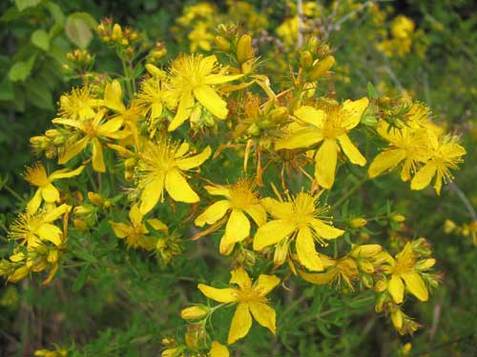St John's Wort: A Special Roadside Medicine
High summer fills my senses with flora aromas and the sweet smells of earth, grass and beach dunes. The intoxicating breezes that carry the scents of summer are messengers of our island’s abundance. Earth really shows what it can do in terms of foliage and flower in the summer. It’s the time of year I am always reminded of where my medicine really comes from - the ground and what grows up from it.
In a society that makes it very easy to rarely or never wander outside, it’s equally easy to forget that what allows for our lives is Nature. We are intrinsically part of the Earth and the wonder of it, the perfection of it, is that what we need to survive, and to thrive, is just growing, living, and dying under our feet.
One of my favourite roadside medicines is Hypericum perforatum, the sun plant St. John’s Wort. St. John’s Wort has a long history of use as a nervine tonic and wound healer. Though it is best known from medical research for its proven anti-depressant actions, this plant does much more. I often use it for people who are emotionally overwhelmed due to stressful life events, trauma, or fatigue. It is excellent for helping to centre a person who can become fearful and loose their feeling of being strong in themselves. This is why traditional herbalist have considered it a remedy related to the solar plexuses where our centre of personal power resides. This is fitting clinically as many people with nervous system instability have weaken digestion, also related to the solar plexus; plus the enteric nervous system residing in our digestive tracts is almost as extensive as the central nervous system. The leaves allow small bits of light to pass through (they have tiny perforations) and this relates to its old use of protecting from darkness and allowing light to shine through a hopeless or lost person.
Hypericum perforatum is a nervine tonic. Tonic is a botanical description for a substance that supports, nourishes, and balances the body. St John’s Wort being a nervine tonic means that it does this for the nervous system. St John’s Wort is used topically for wounds in highly innervated areas and it exerts an anti-inflammatory effect on the nerves. This anti-inflammatory effect may also be part of how it helps alleviate depression since depression and inflammation are clinically correlated. Another medicinal use of St. John’s Wort is for treating viruses like the herpes family which includes Epstein Barr Virus (causes mononucleosis), cold sores, and genital herpes. As many people know from experience some of these viruses can lay dormant in, and affect nerves. For example herpes zoster reactivates when a person’s immunity diminishes and presents as shingles, and there may be a link between Bell’s Palsy and herpes viral infections.
In my practice I typically use herbs that have been extracted in alcohol and water to make tinctures which are then made into easily dissolved tablets. The herbs used are tested for chemical contamination and for the active constituents which make the plant a strongly medicinal plant. Different plant sub species may or may not have the same medicinal strengths and so I use botanicals I can rely on clinically. In the past healers and medicine people would have known which plants were strong and they weren’t dealing with pesticides, herbicides and industrial contamination of soil. Despite this, the simple presence of this herb on the roadside and in fields is a reminder of where medicine comes from and that whenever we pay more attention it is there to helps us. Old uses would have included drying the herb and making tea or bundling it to have as a protecting presence in your home and you can soak the flowers in oil to make a topical application. And of course making friends with Nature by appreciating seeking out the presence of this peace bringing, light filled plant will uplift your spirit. In sunny areas look for its woody stem, small green leaves, and bright yellow 5 petal star shaped flowers that bloom from late June until September. As more and more corroboration of what naturopaths have been saying for about 100 years is being published as news in scientific literature there is little room for reasonable doubt that time in Nature is the best anti-depressant of all. If you suffer from depression or a mental health problem I recommending the care of a qualified health professional in addition to time in Nature.

